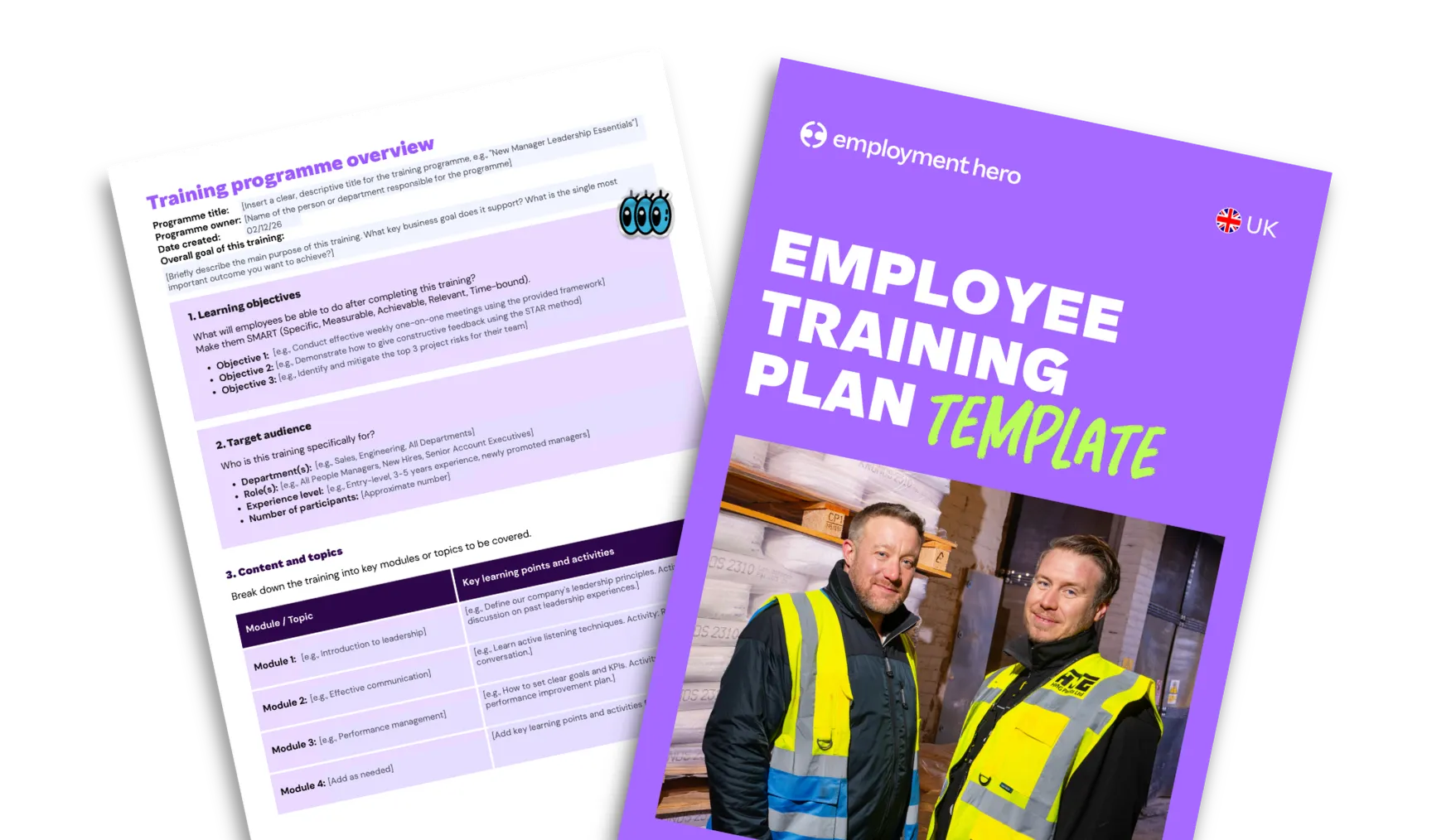Casual worker agreements: What employers need to know
Published
Casual worker agreements: What employers need to know
Published
Casual worker agreements are a vital part of managing flexible staff in the UK. They set out clear expectations, outline rights and help employers stay compliant with the law. Whether you’re in HR, people operations or a business owner managing seasonal or ad-hoc workers, understanding these agreements is essential.
Here, we’ll explain what casual worker agreements are, how they differ from other types of contracts and what to include to protect both your business and your workers. Let’s get started.
What is a casual worker agreement?
A casual worker agreement is a written document that sets out the terms under which a casual worker is engaged. In the UK, casual workers are not the same as permanent employees. They usually work on an as-and-when-needed basis, without a guaranteed number of hours.
Legally, casual workers are classed as workers rather than employees. This means they are entitled to certain statutory rights, such as the National Minimum Wage, holiday pay and rest breaks, but they do not usually have the same protections as employees, such as redundancy pay or protection against unfair dismissal until they have the necessary qualifying service.
A well-written casual worker agreement typically includes:
- The nature of the relationship and the lack of guaranteed hours.
- Details about pay rates and payment frequency.
- Information about holiday entitlement and pay.
- Arrangements for accepting or declining work.
- Termination clauses.
Do casual workers need a contract?
Yes. UK law requires that all workers, including casual workers, receive a written statement of their terms and conditions from day one. This is sometimes referred to as a contract or statement of particulars.
Providing a written casual worker contract is not just a legal obligation. It also protects both parties by making sure there is no confusion about rights, responsibilities or expectations. Many employers mistakenly think that casual means informal and that paperwork is optional. In reality, failing to set terms in writing can lead to disputes, misunderstandings and legal risk.
Casual contracts vs zero-hours contracts: what’s the difference?
Although the terms are often used interchangeably, casual contracts and zero-hours contracts are not identical. Understanding the distinction is key when deciding which type of agreement best fits your staffing needs. Here we explore the difference between them.
| Casual Contract | Zero-hours Contract | |
|---|---|---|
| Definition | Agreement for work offered on an irregular or ad-hoc basis, with no guarantee of hours. | Agreement with no set minimum hours, but the worker must be available when needed. |
| Mutuality of obligation | No obligation for the employer to offer work and no obligation for the worker to accept it. | The employer offers work as needed and the worker is generally expected to accept. |
| Typical use cases | Seasonal staff, event work, one-off projects. | Retail, hospitality, care work or shift-based roles. |
| Legal considerations | Fewer ongoing commitments, but still covered by worker rights. | Same statutory worker rights, plus rules on exclusivity and scheduling. |
What to include in a casual worker agreement
A casual worker agreement should provide clarity and comply with UK employment law. It should cover:
- Hours of work and how they will be offered.
- Pay rate, payment frequency and method.
- Holiday entitlement and how it accrues.
- Sickness absence procedures.
- Termination clauses and notice periods.
- Health and safety obligations.
- Confidentiality and data protection.
Some terms are mandatory under UK law, such as pay details and holiday entitlement. Others, like non-compete clauses or additional benefits, are optional.
It’s also worth keeping up to date with legal developments. For example, case law on mutuality of obligation can affect whether a worker might be reclassified as an employee. Staying compliant helps you avoid tribunal claims and penalties.
Disclaimer: This information is for general guidance only and does not constitute legal advice. For advice specific to your situation, consult a qualified legal professional.
Best practices for managing casual workers
Having a strong casual worker agreement is important, but how you manage these workers day-to-day will have the biggest impact on productivity, engagement and retention. Effective management also helps avoid disputes and ensures compliance with UK employment law.
1. Onboard thoroughly
Even though casual workers may only be with you for short assignments, they still need proper onboarding. Give them clear information about your organisation, health and safety procedures, key contacts and expectations for conduct. Digital tools like onboarding software make this process faster and more consistent, ensuring no important details are missed. For a step-by-step process, see our onboarding guide for casual employees.
2. Keep accurate records
Good record-keeping is essential for payroll compliance. Track the hours worked, holiday accrued and any shifts declined. These records will protect you in the event of a dispute and help with workforce planning. Digital HR systems make it easier to store and retrieve these details, reducing admin time.
3. Communicate clearly and consistently
Casual workers often juggle multiple jobs. To avoid confusion, set clear processes for offering shifts and confirming availability. This could be through a scheduling platform, a shared calendar or an agreed text or email process. Provide advance notice of work whenever possible, especially for weekend or public holiday shifts.
4. Respect holiday pay and working time rules
Casual workers are entitled to paid holiday based on hours worked, usually calculated as 12.07% of total hours. Make sure you track and pay this entitlement regularly, not just at the end of an assignment. Also, follow the Working Time Regulations to ensure staff do not exceed weekly hour limits and get required rest breaks.
5. Provide fair treatment and inclusion
Even if a casual worker is only with you for a few days, they should feel part of the team. Include them in relevant meetings or briefings, introduce them to permanent staff and give them opportunities to provide feedback. This helps maintain morale and improves the quality of work delivered.
6. Review performance and offer feedback
Short-term workers benefit from timely, constructive feedback. A quick check-in after each shift or project can help address any issues and improve future performance. Keeping high-performing casual workers in your talent pool means you can rely on them for future projects.
7. Stay up to date with legal changes
Employment law for casual workers can change quickly, particularly in areas like holiday pay calculations or mutuality of obligation. Regularly review your agreements and processes to ensure compliance and avoid unexpected liabilities.
Ready to create compliant casual worker agreements?
Managing casual staff doesn’t need to be complicated. Our Employer Checklist for Casual Worker Agreements gives you a clear, step-by-step guide to what you must include and what to avoid when drafting contracts.
With Employment Hero, you can go one step further: generate legally compliant agreements in minutes, onboard casual staff seamlessly, and manage payroll and entitlements with ease.
Download your free Casual Workers Agreement Checklist now and start hiring casual workers with confidence.
Casual worker agreement FAQs
Notice requirements depend on what is set out in the agreement. If no notice period is specified, work can usually end without notice.
Yes. If a casual worker regularly works set hours over a long period, they may gain employee status, with additional rights.
Only if they have employee status and meet the qualifying service period, usually two years.
There is no legal time limit, but ongoing patterns of work could change the worker’s status.
They are entitled to statutory sick pay if they meet the eligibility requirements, such as earning above the lower earnings limit.
Yes. Holiday entitlement accrues based on hours worked.
Yes. Unless the agreement states otherwise, they are not obliged to accept offered work.
A freelancer is self-employed and runs their own business, while a casual worker has a contract to provide work personally and is entitled to worker rights.
Yes, verbal agreements can be binding, but proving the terms in a dispute is difficult. A written agreement is always safer.
Register for the downloadable
Related Resources
-
 Read more: EOFY HR Audit: What to Review in March
Read more: EOFY HR Audit: What to Review in MarchEOFY HR Audit: What to Review in March
Complete a EOFY HR audit with our practical checklist. Review compliance, people processes and compliance to reduce risk before the…
-
 Read more: How to Choose an HR System: A 2026 Buyer’s Checklist
Read more: How to Choose an HR System: A 2026 Buyer’s ChecklistHow to Choose an HR System: A 2026 Buyer’s Checklist
HR software is more than features. Discover how the right system can streamline operations, boost efficiency and future-proof workforce management.
-
 Read more: How to Create an Employee Training Plan: Template & Guide
Read more: How to Create an Employee Training Plan: Template & GuideHow to Create an Employee Training Plan: Template & Guide
Ready to build a training program that drives results? Learn how to create an effective employee training outline that aligns…



















